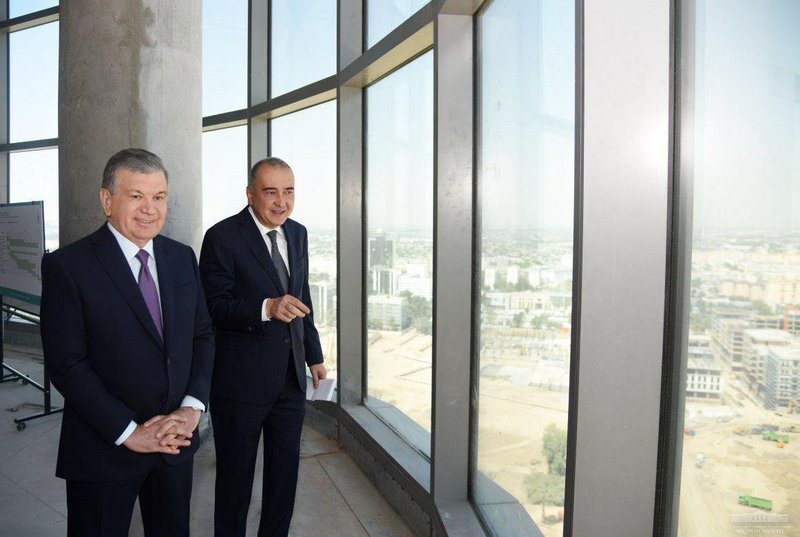Originally published on Open Democracy
In recent years, the idea that Central Asia is closed off to the rest of the world has been increasingly debunked. Whatever hardships ordinary citizens face – and there are many – the region’s rich and powerful have proven avid consumers of all the benefits, licit and illicit, that globalisation has to offer.
Anonymous shell companies staffed by nominee directors and shareholders, offshore bank accounts in secrecy jurisdictions, asset “protection” services, tax “minimisation” services, private wealth management, estate planning – all this and more is supplied by lawyers, accountants and consultants steeped in western credentials.
This is why a new series of investigations, Power Briefs | Central Asia, is using data science and open source intelligence techniques to track details of transnational ownership that have been otherwise left largely unexplored. In a recent report, Power Briefs examined the serious potential for conflicts of interest as Uzbekistan undergoes rapid privatisation and business reforms.
In particular, the report found that numerous businesses belonging or connected to Jahongir Artykhodjaev, the Mayor of Tashkent, and his business partners, stand to benefit from privatisation and property development initiatives being pushed through under President Shavkat Mirziyoyev. These businesses primarily operate under the Artel and Akfa brands – Uzbekistan’s equivalent of Samsung and Unilever respectively. Both were founded by Artykhodjaev.

President Shavkat Mirziyoyev and Mayor Jahongir Artykhodjaev visit Tashkent City, June 2019 | Source: President of Uzbekistan
In this investigation, we look closely at how businesses operating within the Artel-Akfa group use the UK’s lax corporate transparency regime.
With Artykhodjaev’s Akfa-Artel group significantly increasing its market share in Uzbekistan off the back of state assistance, this research raises concerns about how UK corporate entities are employed abroad, as well as the UK’s disclosure standards.
“This evidence reveals shocking continuing use of Limited Partnerships to hide ownership, despite repeated warnings about the opacity of English and Scottish Limited Partnerships,” says Anneliese Dodds MP, Shadow Financial Secretary to the Treasury.
“It appears that there is very little action being taken against those LPs which fail even to follow the relatively weak requirements currently in place.”
Big business, no assets
Corporate disclosure records submitted by UK entities tied into the Akfa-Artel group reveal evidence of improper techniques being used to circumvent new transparency rules on beneficial ownership.
The Akfa-Artel group’s ownership structure is complex. Some companies are owned by Jahongir Artykhodjaev himself (at least up until March this year). Shares in other group vehicles are owned by his wife, and two close affiliates, Abror Ganiyev and Ismail Israilov. Ganiyev and Israilov are Akfa-Artel company executives. Both declined to comment when asked if they are the real or nominee owners of these shares.
We also observe UK registered entities that have virtually no declared assets and negligible profits either holding shares or channeling major investment into the Akfa-Artel group in Uzbekistan.
Take the example of Dartlex Impex LLP, an English Limited Liability Partnership established in September 2009. By any definition, Dartlex Impex is a UK LLP with a significant stake in Uzbekistan’s economy.
Since incorporation, Dartlex Impex has owned shares (95.7%) in the Akfa-Artel group through White Machine Technology LLC, which was set up in Uzbekistan during April 2011.
In 2015, Dartlex Impex was also listed as the Akfa-Artel group’s British partner in a $35.2 million joint venture in the Navoi Free Industrial-Economic Zone, a special economic zone in Uzbekistan.
During this investment period, Dartlex Impex declared a profit of £3,750 – barely enough to buy a second-hand car. Its net assets were recorded as £37,694.
The accounts for Dartlex Impex are signed off by a suburban dentist from Brussels, Ali Moulaye. Moulaye is reported to have signed accounts for over a hundred British companies. When tracked down by Buzzfeed, Moulaye alleged he had been duped: “I have no clue what these companies are, where they are based, and what’s their business.”

Concept art for Lot 1, Tashkent City | Source: Tashkent City
In 2015, another English Limited Liability Partnership, Wynex Innovation LLP, was reported to be spearheading a joint venture in Uzbekistan – a US$2 million investment for producing mobile phones under Artykhodjaev’s Artel brand. At the time, Wynex Innovation had no declared assets, and an operating net loss of £419.
More recently, Wynex Innovation LLP appears as a foreign investor in Tashkent City, a flagship $1.3 billion property development that is reshaping the heart of the Uzbek capital. Tashkent City is a public-private initiative that falls within the portfolio of Tashkent Mayor Jahongir Artykhodjaev, who was formerly the public-private initiative’s director.
Wynex Innovation LLP’s role in Tashkent City takes place through its 8.19% interest in High Land City LLC, which is the sole investor in the project’s Lot 1 – a set of 1180 apartments.
In its annual accounts for 2018, Wynex Innovation states it has no income, and reports an operating loss of £1,500. The LLP also claims it has £300 in cash.
According to Uzbekistan’s business register, High Land City’s largest shareholder (81.24%) is Ismail Israilov. The latter is listed as a manager for Akfa Engineering and Management, a company 100% owned by Jahongir Artikhodjaev according to March 2019 investigations.

Demolishing an apartment block to make way for Tashkent City | Source: Atkhan Akhmedov
While UK Limited Liability Partnerships have to disclose enough financial information that vigilant members of the public can report and identify irregularities, UK Limited Partnerships generally do not have these requirements.
In recent years, Scottish Limited Partnerships (SLPs) have risen to particular prominence. This is due to the number being registered (the number of registrations rose by 430% between 2007 and 2016, as found by Transparency International-UK), and their proximity to opaque practices and money laundering scandals.
“These superficial companies have enabled theft, bribery and organised crime to thrive around the world under the veneer of a legitimate UK enterprise,” writes Transparency International-UK.
SLPs not only offer limited liability to partners, and a potential cloak for beneficial owners who do not wish their name to appear on a public record. They are also a distinct legal entity separate from their partners. As a result, SLPs can enter contracts and open bank accounts. This has made them attractive for non-transparent business activities.
Take the example of MacMerry Management LP and Grandes Investment Group LP, two Scottish Limited Partnerships (SLPs).
MacMerry Management LP has an extensive Uzbekistani stock portfolio, including a 78.73% interest in Artel’s Technic Globe LLC, and 50% stakes in Quality Electronics, Factory of Technologies, Asia Electron and Next Generation Products. Through these four firms, MacMerry Management LP is an investor in Lots 1 and 7 in Tashkent City – a series of apartment buildings, commercial zones and hotel complexes in the centre of the Uzbek capital.
Grandes Investment Group LP, registered in January 2017, has a 38.95% in Uzbek confectionery retailer Craffers. This Scottish Limited Partnership jointly owns Craffers with Jahongir Artikhodjaev and his business partner Abror Ganiyev, among others.
There is little financial information available about either of these SLPs investing in Uzbekistan. We only know MacMerry Management LP has £50 in starting capital contributed by its Seychelles-based partner Longford Solutions Ltd. In the case of Grandes Investment Group LP, it has £100 in starting capital contributed by another Seychelles partner, Tormex Alliance Ltd.
Despite operating from UK shores, the British public cannot access any financial information on these Scottish Limited Partnerships.
The situation becomes even more complicated when it comes to those standing behind Grandes Investment Group LP.
This company originally declared a beneficial owner, or “person with significant control” (PSC), on 24 October 2017. Such declarations are a new UK transparency requirement which aims to place on the public register those entities or individuals that exert serious control over a company, or which have a 25% or greater beneficial interest.
The PSC declared (Grandes Investment Growth LP) was an English Limited Partnership. English Limited Partnerships are not a registrable legal entity under the new 2017 PSC regime. English LPs do not have to declare beneficial owners or persons exerting significant control over the partnership.
The UK reforms aim to create an environment in which a diligent researcher can follow a chain of PSCs to arrive at the top of the pyramid, where one will hopefully discover one individual or more. Loopholes in the reforms, however, allow a range of openings to circumvent disclosure requirements.
In the case of Grandes Investment Group LP, it declared a new PSC on 5 November 2018. The new PSC, Grandes Investment Holding Group LP, is a Scottish Limited Partnership. It was registered on 25 October 2018.
The company has declared “there is no person identified as a person with significant control… in relation to the limited partnership”. It is entitled to do this under the UK reforms. We just have to trust the management of Grandes Investment Group that there is nobody with a 25% or greater beneficial interest in the firm.
The wheels keep on turning
UK Legislation introduced in 2017 provides for fines and even criminal liability if a UK registered entity does not declare a legitimate “Person of Significant Control” (PSC) to Companies House. When we wrote to Companies House (CH) in April this year, we were told that it had yet to fine any SLP for non-compliance with regards to the new PSC regime.
“Compliance is Companies House’s primary aim, rather than prosecution, and it is taking action to ensure that all SLPs report their PSC information,” Companies House press office stated in an email to openDemocracy. “In the meantime, CH is working closely with the Insolvency Service and the Crown Office and Procurator Fiscal Service to prepare the ground for prosecutions.”
Without any system for verification or risk-based audits, in practice near complete trust is placed in legal entities and formation agents to act with honour and integrity.
Formation agents are a notable cog in this whole process. They offer a complete service to foreign clients such as the Akfa-Artel group. Formation agents help clients set up companies, bank accounts and, where needed, provide nominee Directors or Partners to oversee the legal entity.
We raised concerns over the use of nominee directors in UK companies with Companies House. Companies House responded that “there is no provision for in the Companies Act for the disqualification of a nominee director”.
However, Companies House pointed out that the UK Government has proposed increasing the information required from limited and general partners. This would include possible company registration via an anti-money laundering unit and annual confirmation statements for limited partnerships to ensure that an LP has an ongoing connection to the UK.
Likewise, when it comes to company accounts for limited liability partnerships, Companies House stated the following: “If we had a report of a clear disparity between what had been shown in accounts on the public record and what was happening, then yes, we would contact the LLP and make appropriate enquiries.”
Financial crime consultant Graham Barrow said that while Companies House had “signaled its willingness” to consult on reforms to the company registration process and the role of formation agents, “operatives in the shadowy world of money laundering are agile and intelligent”.
“It is depressing for those of us working to identify criminal activity to see the same names, addresses and modus operandi time and time again, apparently impervious to and immune from any efforts to stop, or even slow, the use of UK entities in these shady schemes.”
For the Uzbekistani public, they have the unedifying duty of watching British offshore entities – which are part of a group with direct ties to the Mayor of Tashkent – scoop up significant state-subsidised business in their country. Still reeling from previous corruption scandals where senior state operatives concealed their control of Uzbekistani companies through opaque offshore entities, public integrity and human rights activists in Uzbekistan want greater transparency.
The Mayor and Akfa-Artel declined to comment on the group’s use of offshore entities when asked by openDemocracy. The entities mentioned in the article did not respond to our questions either.
Only the Uzbekistani government agency responsible for the Tashkent City property development replied to our questions on investor transparency stating:
“Regarding the beneficiaries and persons with significant control, who are behind the investors, we would like to point out that according to the laws of the Republic – ‘On foreign investment’, ‘On guarantees and measures to protect the rights of foreign investors’, ‘On guarantees of freedom of entrepreneurial activity’ – the release of this information is not envisaged.”